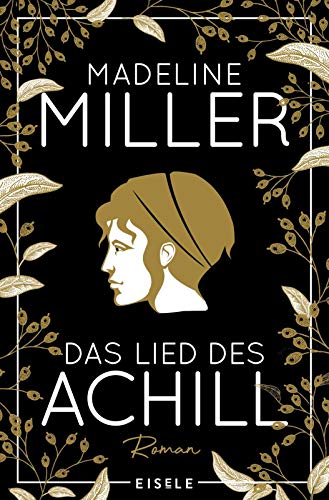
Der Mythos Achill - Modern und fesselnd neu erzählt
Achill, Sohn der Meeresgöttin Thetis und des König Peleus, ist stark, anmutig und schön – niemand, dem er begegnet, kann seinem Zauber widerstehen.Patroklos ist ein unbeholfener junger Prinz, der nach einem schockierenden Akt der Gewalt aus seinem Heimatland verbannt wurde. Ein Zufall führt die beiden schon als Kinder zusammen, und je mehr Zeit sie gemeinsam verbringen, desto enger wird das Band zwischen ihnen. Nach ihrer Ausbildung in der Kriegs- und Heilkunst durch den Zentauren Chiron erfahren sie vom Raub der Helena. Alle Helden Griechenlands sind aufgerufen, gegen Troja in den Kampf zu ziehen, um die griechische Königin zurückzuerobern. Mit dem einzigen Ziel, ein ruhmreicher Krieger zu werden, nimmt Achill am Feldzug gegen die befestigte Stadt teil.
Getrieben aus Sorge um seinen Freund, weicht Patroklos ihm nicht von der Seite. Noch ahnen beide nicht, dass das Schicksal ihre Liebe herausfordern und ihnen ein schreckliches Opfer abverlangen wird.
- ISBN10 3961610827
- ISBN13 9783961610822
- Publish Date 1 March 2020 (first published 5 September 2011)
- Publish Status Active
- Imprint Julia Eisele Verlag GmbH
- Format Paperback
- Pages 416
- Language German
Reviews


viking2917

luddite
This book has all the feels. It's so beautifully written, and so very intimate. I've been a big fan of the Iliad and Greek myths in general since 6th grade, but Miller brings an intimacy that livens up every old legend I know.
Read this.

adamfortuna

emruth13

Beth C.

Brianna

elysium
I was so bored and didn't like any of the characters...

nitzan_schwarz
Look, this is a good book. I'm not going to say otherwise. But at the same time, it kind of disappointed me. I guess I shouldn't have gone into it thinking it's going to be a life-altering book, but I kind of did. I blame Tumblr. I have seen so many posts and talks of this book and Patroclus and Achilles that in my head I was already in love with the idea of watching them fall in love.
I should probably mention that I don't usually go out to seek "gay" romance stories. Most of the time, I just kind of stumble into an LGBTQ couple unknowingly, but those couples are also at the absolute top of my couples list for how fiercely I am in love with them. So when I heard of this book, I was kind of imagining a similar experience to what I had with All for the Game (The Foxhole Court) and The Raven Cycle (the Raven Boys). You know - that almost religious experience? Dramatic, but accurate. I didn't get that.
What I loved about THOSE series was that the couple kind of sneaked on us. We spent so much time simply watching them as friends that we needed no words or actions to know they loved each other. We were shown, not told, the vastness of their emotions towards one another. Here, it's more of a "tell, no show" kind of thing. I am told that "after that, they were best friends" and that they talked of "this and this and this", but I didn't get to see those interactions happen. I knew they loved each other, but I also felt like I was largely robbed of many of their conversations and interactions. I was simply told they happened, and I was meant to understand that the love grew from those mysterious, hour-lasting talks that I was not privy to. I am not the biggest fan of that form of storytelling.
Now, this is not to say I didn't believe their love, or that I didn't cry at the end there, BECAUSE I DID. Not gonna lie. I loved how fiercely Achilles was protective of their relationship and that no one will take it from them. This is ancient Greek, y'all. This sort of love is not really acceptable. But neither is letting go, until death and beyond. And while a part of me was a bit disbelieving that NO ONE seemed to care about this illicit relationship, I was so there for this mutual love and respect.
But there were a lot of things I wished to see. I wanted to see Patroclus becoming a valuable part of the war on his own. There was precious little of this, and I wanted to see (not be told) of people appreciating his medicine and his kind nature. There was precious little of that. I wanted to see him interacting with more people in general. I wanted to see him appreciated, god damn it, by more than Achilles alone.
Anyways, I was worried at first about reading a story with characters that I knew got no happy endings, but the blow was lessened by the characters KNOWING their fates. They did not go to die unknowingly.
Final note. I wasn't a big fan of the writing. At certain points, I thought it beautiful, but most of the time it felt like WAY TOO MUCH. Too flowery or trying too much to be beautiful. It literally cringed at times. I know I'm pretty much alone at this and everyone LOVES the way this book is written but it took me a long time to get used to sentences like this:
"One by one, Achilles caught the remaining fruits, returned them to the table with a performer’s flourish. Except for the last, which he ate, the dark flesh parting to pink seeds under his teeth. The fruit was perfectly ripe, the juice brimming. Without thinking, I brought the one he had thrown me to my lips. Its burst of grainy sweetness filled my mouth; the skin was downy on my tongue."
Or
I kissed his neck, the span of his chest, and tasted the salt. He seemed to swell beneath my touch, to ripen. He smelled like almonds and earth. He pressed against me, crushing my lips to wine.
Like, first, why??? Why are the figs described so... so... cringe-worthy?? And I did not need to know Achilles "ripened", thank you very much. Like, you're making a coming together of two characters I love feel so awkward and weird and overly done. And second, what does some of this even mean?? Crushing lips into wine???
There were a lot of descriptions like this that made me kind of shudder at how uncomfortable they were. Again, probably just me, as I've seen nothing but praise for Miller's style, but SO not my thing. If I didn't like the characters, I probably would have stopped reading JUST because of how painful some of this was...

gmcgregor
As most of us know, it was not uncommon in Ancient Greek life for older men to have sexual relationships with younger men. Homosexual relationships between men of the same age, however, were rarer. When I was taught The Iliad, even in college, the bond between Patroclus and Achilles was usually described as just a deep friendship (lip service was paid to the idea they could have been lovers but it was never taught as being the more persuasive interpretation). Miller's novel, however, roots itself in the alternate interpretation: she presents us with Achilles, the most gifted warrior in Greece, as a man in a loving and stable lifelong relationship with Patroclus.
It would actually be more accurate to say she presents us with Patroclus as the romantic partner of Achilles: the story belongs to Patroclus, it is told through his eyes. Patroclus as created by Miller is a gentle soul, a disappointment to his aggressive father, who is banished when he kills another child purely by accident. He is sent to Peleus, father of Achilles, to be fostered, and is chosen by Achilles of all the young men at court to be his companion. Their relationship only gradually becomes romantic, much to the disgust of Achilles' river goddess mother, Thetis. She conspires more than once to break the couple apart, but their love is too strong and they remain together until the end. Miller explains Achilles' rage over the theft of his slave girl as being not about being deprived of a lover, but as being disrespected as the greatest soldier in the army by having his rightfully-claimed prize taken away.
I found it a much more enjoyable take on the story than the original. Miller really gets the time to develop Patroclus and Achilles as characters in depicting them from boyhood all the way through adulthood. She paints a very devoted relationship between them: though both briefly experiment with sex with women, they never stray from each other and Achilles refuses to leave Patroclus despite strong maternal pressure to do so. Since Miller's Patroclus isn't a skilled or enthusiastic warrior and instead serves the Greek contingent at Troy as a healer, most of the battlefield scenes that I find so boring to read are left out entirely. This is a solid read for fans of historical fiction and/or classical retellings.
